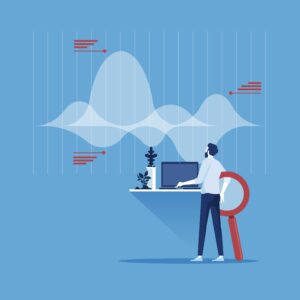
Navigating DataOps: ISG Buyers Guides to the Best Solutions

Source: Shutterstock
The world of data management is more complex than ever. Information Services Group (ISG), a global technology research and advisory firm, predicts more than half of enterprises will embrace DataOps by 2026.
However, with the plethora of software platforms and service providers available, it can be challenging to find the right solutions for your organization’s data pipelines, observability, and orchestration needs.
ISG aims to make it easier to identify and select the most suitable data management solutions. The 2024 ISG Buyers Guide for DataOps evaluates software providers across five key DataOps categories to help understand, assess, optimize, and select software providers. Here is an overview of the five ISG buyers guides.
DataOps
ISG highlights that as enterprises scale their AI and analytics initiatives, the need for agile, collaborative, and automated data operations is becoming increasingly critical. Traditional approaches to data management, such as manual, batch-based methods are no longer sufficient to keep up with modern data demands.
As there is no universal industry standard defining the full scope of DataOps, some vendors are taking a broader approach, including all aspects of data management in this category. ISG aligns more with a narrower and more practical scope, with a focus on automation, orchestration, observability, and productization.
According to ISG, “DataOps products and services provide the following functionality: agile and collaborative data operations; the development, testing, and deployment of data and analytics pipelines; data orchestration; data observability; and the delivery of data products. These are the key criteria we used to assess DataOps products and services as part of this Buyer’s Guide.”
ISG research predicts that by 2027, over 50% of enterprises will adopt orchestration to enhance data workflows. As the data ecosystem grows, data orchestration will play a bigger role in automating and optimizing data pipeline execution.
A characteristic of the best DataOps solutions, as identified by ISG, is the ability to fully integrate with enterprise ecosystems. This can go a long way in reducing manual effort, enhancing efficiency, and providing real-time monitoring for accuracy and reliability.
ISG ranks Informatica, Microsoft, and IBM as the leading providers of DataOps solutions.
Data Orchestration
Businesses striving to innovate with data face a growing challenge in managing an intricate web of data pipelines. As data sources multiply, manual management and fragmented processes quickly become a bottleneck. This is where data orchestration comes in.
ISG defines data orchestration as a means to automate and accelerate the flow of data, ensuring that it reaches the right systems at the right time. Data orchestration tools must encompass three key capabilities: data collection, data transformation, and data activation.
According to ISG, data orchestration is no longer a niche capability, it’s becoming a necessity. But with different solutions offering varying levels of functionality, selecting the right tool requires careful consideration.
The buyer guide breaks down the market, assessing key vendors on their pipeline management, workflow automation, and deployment capabilities. Shifting away from traditional data management, the best modern data orchestration tools facilitate real-time and agile data pipelines with the ability to adapt to evolving business needs.
“Adoption of data orchestration is still in the early stages and is closely linked to larger data transformation efforts that introduce greater agility and flexibility,” ISG explains. “If an enterprise’s data processes and skills remain rooted in traditional products and manual intervention, then data orchestration is not likely to be a quick fix.”
Based on ISG findings, the top three data orchestration providers are Databricks, Microsoft, and Alteryx.
Data Observability
Enterprises rely on data observability to ensure the quality and reliability of data flowing through pipelines. Most enterprises will be turning to automated data observability tools by 2026 to build trust in their data. However, not all solutions are created equal.
According to ISG, “data observability tools monitor not just the data in an individual environment for a specific purpose at a given point in time but also the associated upstream and downstream data pipelines.”
With different levels of functionality available, businesses need to take a close look at their options to find a tool. ISG Data Observability Buyers Guide evaluates the ability of several solutions to detect, resolve, and prevent data reliability issues. This includes the ability to track data lineage, metadata, and logs.
While data quality tools focus on ensuring data accuracy and completeness for specific use cases, data observability tools monitor a broader data environment, detecting pipeline failures and inconsistencies before data becomes unreliable. Ideally, data observability solutions should offer both capabilities, with data quality and data observability tools complementing each other.
Monte Carlo, DQLabs, and Acceldata were picked as the top three providers of data observability solutions.
Data Pipelines
ISG research shows that 22% of enterprises analyze data in real-time, with an additional 10% doing so hourly. To meet this growing demand, buyers should look for platforms that enable real-time and event-driven data processing.
While traditional ETL pipelines are still relevant, ISG emphasizes that zero-ETL solutions offer increased flexibility by shifting transformations to target platforms.
AI-powered solutions can automate pipeline development and improve efficiency. ISG advises buyers to explore AI-driven platforms for future scalability. In addition, it recommends solutions with Change Data Capture (CDC) to improve real-time data updates by tracking changes at the source. This helps reduce the need for full dataset transfers and enables faster synchronization.
Microsoft, Alteryx, and Databricks were named by ISG as the top data pipeline solutions providers.
Data Products
What exactly are data products? ISG defines them as reusable data assets developed using product thinking and consumed by others on a self-service basis. ISG research forecasts that by 2027, more than 60% of enterprises will adopt technologies that enhance the delivery of data as a product. This shift will be driven by businesses refining their cultural and organizational strategies for data ownership within data mesh environments
When evaluating data product solutions, enterprises should look for platforms that offer self-service discovery, AI-driven automation, and data product development. Tools with strong governance can address the challenge highlighted by the ISG finding that only 16% of organizations report high trust in their data.
As the data product platform market is still evolving, enterprises should assess solutions based on alignment with their specific business needs.
According to ISG, the leading vendors to consider in this category are Microsoft, Informatica, and SAP.
The 2024 ISG Buyers Guide provides valuable insights into the evolving DataOps landscape, helping enterprises assess leading software providers. The Buyers Guides are based on an in-depth evaluation of 49 leading software providers, who were assessed on the product experience, customer experience, and other parameters. The complete reports and detailed research findings are available by contacting ISG Software Research.
Related Items
DataOps.Live: The Data Product Assembly Line for Snowflake
Data Quality Got You Down? Thank GenAI
DataOps.live Recognized as Representative Vendor in Gartner’s 2024 Market Guide for DataOps Tool































